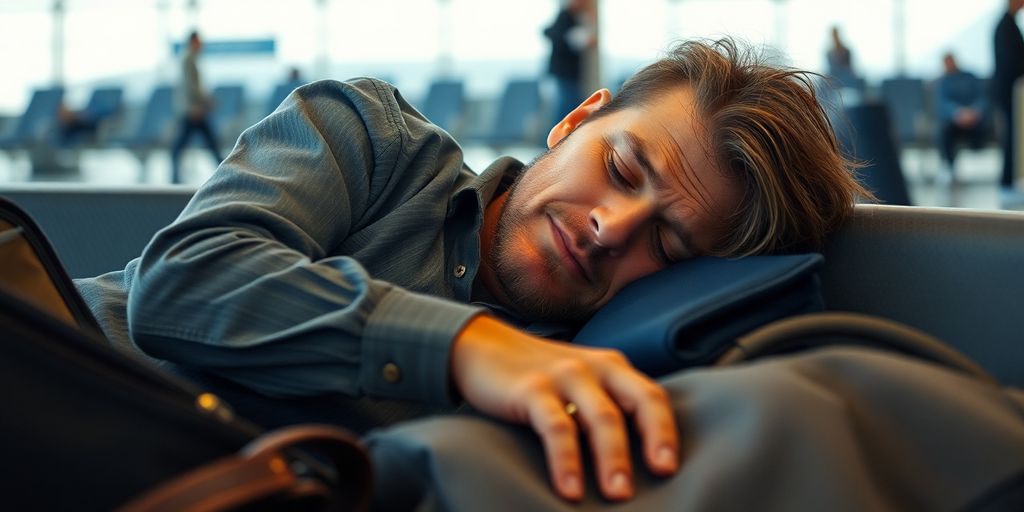Understanding What Causes Jet Lag: Unraveling the Science Behind Travel Fatigue

Ever wondered why flying across time zones leaves you feeling like a zombie? That’s jet lag for you. It’s not just about feeling tired; it’s a whole mess of symptoms that can throw you off your game. But what causes jet lag, really? It’s all about your body struggling to keep up with a new schedule. In this article, we’ll break down the science behind this travel fatigue and explore some ways to tackle it. From understanding your body’s internal clock to exploring modern solutions like IV therapy, we’ve got you covered.
Key Takeaways
- Jet lag happens when your body’s internal clock is out of sync with a new time zone.
- Crossing multiple time zones quickly is the main culprit behind jet lag.
- Symptoms include fatigue, insomnia, and trouble concentrating.
- Light exposure and meal timing can help reset your internal clock.
- New treatments like IV therapy are emerging to combat jet lag symptoms.
The Biological Clock: Understanding Circadian Rhythms
How Circadian Rhythms Regulate Sleep
Our bodies run on a roughly 24-hour cycle known as the circadian rhythm. This internal clock is like a personal timekeeper, managing sleep, wakefulness, and various physiological processes. Circadian rhythms are essential for regulating our sleep patterns. They ensure that we feel awake during the day and sleepy at night by controlling the production of melatonin, the hormone responsible for sleepiness. When this rhythm is disrupted, it can lead to sleep disorders and other health issues.
Impact of Time Zone Changes on the Body
Traveling across time zones throws our circadian rhythms out of sync, resulting in jet lag. This happens because our internal clock is still aligned with the original time zone, causing a mismatch with the local time. Symptoms like fatigue, insomnia, and irritability are common as the body struggles to adjust. The speed at which we adapt depends on the number of time zones crossed and individual differences in circadian rhythm flexibility.
The Role of Light Exposure in Resetting the Clock
Light exposure is a powerful tool for resetting our biological clock. Natural sunlight is the most effective, as it influences the production of melatonin and helps align our internal clock with the local environment. To combat jet lag, it’s recommended to get outside during daylight hours and avoid bright screens or artificial light before bedtime. This helps to gradually shift the circadian rhythm to match the new time zone, easing the transition for travelers.
The Science of Sleep Disruption: What Causes Jet Lag

Effects of Crossing Time Zones
Traveling across multiple time zones throws off our body’s internal clock, known as the circadian rhythm. Imagine your body being set to wake up at 7 AM, but now you have to adjust to waking up at 4 AM. This mismatch can leave you feeling groggy and disoriented. The more time zones you cross, the more confused your internal clock becomes. It’s like trying to reset a clock that refuses to cooperate.
Symptoms and Severity of Jet Lag
Jet lag isn’t just about feeling tired. It can come with a whole host of symptoms: insomnia, daytime fatigue, difficulty concentrating, and even stomach problems. Some people might find themselves wide awake at midnight, while others struggle to stay awake during the day. The severity of these symptoms can depend on how many time zones you’ve crossed and your body’s own resilience.
Factors Influencing Jet Lag Recovery
Recovering from jet lag isn’t the same for everyone. Some folks bounce back quickly, while others might take days to feel normal again. Factors like age, the direction of travel, and even light exposure can play a role. For instance, traveling east is often harder because you "lose" time, making it tougher for your body to adjust. Plus, exposure to blue light from screens can mess with your sleep patterns even more. Balancing this exposure is key to easing recovery.
Nutritional Interventions: Can Diet Help Mitigate Jet Lag?
Role of Hydration in Combating Fatigue
Staying hydrated is crucial when dealing with jet lag. The dry air in airplanes can dehydrate you faster than you might think. Water is your best friend here. It’s good to drink plenty of it before, during, and after your flight. Avoid alcohol and caffeine as they can make dehydration worse. You might not feel thirsty, but trust me, your body needs it.
Essential Vitamins for Energy and Recovery
Vitamins play a big role in how energetic you feel, especially when your body clock is out of whack. Vitamin B complex, for instance, helps in energy production and can be a lifesaver when you’re feeling sluggish. Vitamin C is also great because it boosts your immune system. Having a balanced diet with these vitamins can help you bounce back quicker.
Foods That Support Circadian Rhythm Adjustment
Certain foods can help your body adjust to new time zones. For example, foods rich in melatonin like cherries and nuts can promote better sleep. Meanwhile, protein-rich foods can keep your energy levels up. Here’s a quick list of foods to consider:
- Cherries
- Almonds
- Oatmeal
- Turkey
Eating the right foods at the right times can make a noticeable difference in how you feel when adjusting to a new time zone. It’s not just about what you eat but also when you eat it.
IV Therapy: A Modern Approach to Jet Lag Relief

Benefits of IV Hydration for Travelers
When you’re flying across time zones, your body can get pretty knocked out of whack. IV therapy is like a quick fix for that. It delivers fluids right into your bloodstream, which is way faster than drinking water. This method helps you rehydrate quickly, countering the dry air in airplane cabins that leaves you feeling parched. Plus, it can boost your energy levels, which often take a hit during long flights.
Vitamin Infusions and Immune Support
Jet lag isn’t just about feeling tired. It can also mess with your immune system, making you more prone to getting sick. IV therapy can help here too. By infusing vitamins directly into your veins, it gives your body the nutrients it needs to stay healthy. Essential vitamins like C and B-complex are often included, which are known for their immune-boosting properties. This way, you can step off the plane feeling less like a zombie and more like yourself.
Safety and Considerations for IV Therapy
Before you jump on the IV therapy train, there are some things to think about. It’s generally safe, but not for everyone. If you have underlying health issues, you should definitely talk to a healthcare provider first. They can help figure out if it’s the right choice for you. Also, be aware of potential risks like infections or allergic reactions. It’s a good idea to have a professional administer the therapy to minimize any issues.
Traveling can be exhausting, but with options like IV therapy, you don’t have to let jet lag ruin your trip. It’s about finding what works for you and making travel a little easier.
Lifestyle Strategies to Minimize Jet Lag
Pre-Travel Preparations for Better Adjustment
Before you even board the plane, there are some steps you can take to help your body adjust to the new time zone. Gradually shifting your sleep schedule a few days before departure can ease the transition. Try going to bed and waking up an hour earlier or later each day, depending on your destination’s time zone. This way, your internal clock starts adjusting even before you fly.
Packing a travel kit with essentials like an eye mask, earplugs, and a neck pillow can also make a big difference in how well you rest during the flight. Don’t forget to stay hydrated by drinking plenty of water, as dehydration can worsen jet lag symptoms.
In-Flight Tips to Reduce Jet Lag
Once you’re on the plane, there are several strategies to minimize jet lag’s impact. Adjust your watch to the destination time zone as soon as you board. This simple trick can help you mentally prepare for the time change. During the flight, try to sleep if it’s nighttime at your destination. Use an eye mask and earplugs to block out distractions and make it easier to rest.
Avoid alcohol and caffeine during the flight as they can interfere with sleep and dehydrate you. Instead, focus on drinking water or herbal teas. Stretching and moving around the cabin every hour or so can also help keep your blood flowing and reduce stiffness.
Post-Arrival Routines for Quick Recovery
After landing, it’s crucial to expose yourself to natural light as soon as possible. Light is a powerful tool for resetting your internal clock. Spend time outdoors or sit by a window to soak up some sunlight.
Try to stick to the local schedule for meals and sleep, even if you feel tired. This might mean pushing through some fatigue to stay awake until a reasonable bedtime. Taking short naps, if necessary, can help, but keep them under 30 minutes to avoid disrupting your nighttime sleep.
Getting back on track after crossing time zones is all about patience and persistence. By preparing ahead of time and sticking to a routine, you can help your body adjust more quickly and enjoy your trip to the fullest.
For those interested in natural remedies to help manage jet lag, consider exploring the combined effects of Tongkat Ali and Fadogia Agrestis. These supplements may offer benefits like enhanced energy and improved mood, aiding in overall recovery.
The Psychological Impact of Jet Lag
Mood Changes and Cognitive Effects
Jet lag doesn’t just mess with your sleep; it can also take a toll on your mood and brain. Imagine crossing several time zones and suddenly feeling irritable or down. That’s your body’s way of protesting the shift. Mood swings are common, and some folks even report feeling anxious or depressed. It’s like your emotions are on a roller coaster, and you didn’t even buy a ticket. On top of that, your cognitive abilities might take a hit. Simple tasks can feel like solving a complex puzzle, and concentration? Forget about it. This mental fog can make it hard to get through your day, especially if you’re traveling for work and need to be on your game.
Strategies for Mental Resilience
So, how do you fight back against jet lag’s psychological effects? Here are a few strategies that might help:
- Stay Active: A little exercise can go a long way in boosting your mood and clearing your mind.
- Mindful Breathing: Taking a few deep breaths can help calm your nerves and bring focus.
- Set a Routine: Try to establish a new routine as soon as you arrive. It helps your body adjust to the new time zone.
Long-Term Effects on Frequent Travelers
For those who travel often, jet lag can have long-term effects. Frequent flyers might find themselves constantly battling fatigue and mood swings. Over time, this can lead to chronic stress and even burnout. It’s important to recognize these patterns and take steps to manage them. Regular travelers might benefit from reading best-selling psychology books that offer insights into human behavior and mental health. These resources can help in understanding and managing the psychological toll of constant travel.
Jet lag is more than just a sleep issue. It affects your mind and mood, making it a real challenge for travelers. But with the right strategies, you can minimize its impact and keep your travels enjoyable.
Wrapping Up: The Science of Jet Lag
So, there you have it. Jet lag is more than just feeling tired after a long flight. It’s your body’s way of saying, "Hey, I’m confused!" because your internal clock is all out of whack. We’ve learned that crossing time zones messes with your circadian rhythm, making it hard to adjust to new local times. This can lead to sleep problems, fatigue, and even mood swings. But don’t worry, there are ways to tackle it. From adjusting your sleep schedule before you travel to considering IV therapy for a quick nutrient boost, there are options out there. Just remember, what works for one person might not work for another, so it’s all about finding what suits you best. Safe travels and may your next trip be jet lag-free!
Frequently Asked Questions
What is jet lag?
Jet lag is a temporary sleep disorder that affects people who travel across multiple time zones. It happens when your body’s internal clock is out of sync with the new time zone, leading to tiredness and trouble sleeping.
How does IV therapy help with jet lag?
IV therapy helps with jet lag by quickly rehydrating your body and providing essential vitamins and nutrients directly into your bloodstream. This can help you feel more energized and recover faster from travel fatigue.
What are circadian rhythms?
Circadian rhythms are natural, internal processes that regulate the sleep-wake cycle and repeat roughly every 24 hours. They are influenced by light and darkness in your environment.
Can diet help reduce jet lag symptoms?
Yes, eating the right foods and staying hydrated can help reduce jet lag symptoms. Foods rich in vitamins and minerals can support your body’s adjustment to a new time zone.
What are common symptoms of jet lag?
Common symptoms of jet lag include feeling tired during the day, having trouble falling asleep at night, headaches, and difficulty concentrating.
How long does it take to recover from jet lag?
Recovery from jet lag can vary, but it usually takes about a day for each time zone crossed. Some people recover faster by using strategies like adjusting their sleep schedule before traveling.








Responses